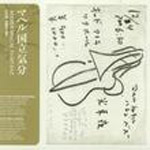|
|
 |
Dusted Reviews
Artist: Maher Shalal Hash Baz Album: Live 1984-1985 Label: PSF Review date: Aug. 20, 2006 |

|
|
|
 |
Touted as the most mysterious of a legion of secret-shrouded acts under the broad umbrella of Japanese free improvisation, Maher Shalal Hash Baz have released a handful of ramshackle pop records intermittently over the past two decades that have basked in considerable praise, even as critics struggle to identify what exactly it is the band is trying to accomplish. Their records seem more like assemblies of fleeting notions than suites of songcraft. Songs rarely stretch beyond two minutes; somber, heterophonic phrases of guitar and harmonium scamper alongside the other, then vanish; the voice of Tori Kudo, the band’s leader and sole constant member, frolics amidst the instruments with a deadpan delivery informed simultaneously by a prelingual child and a post-rehab mumbler.
Often, MSHB’s sound is described as “childlike” and therefore “innocent," descriptors undoubtedly inspired by the band’s quaint arrangements and Kudo’s simplistic lyrical murmurings. In an old interview, Kudo challenges the correlation, offering that “the neat unison of an orchestra” be considered “childish," and that heterophony is “a technique of ancient music." Across its lengthy career, the band has charted an peculiar dichotomy: Couched within a pop idiom that offers no pretense to experimentation are studied meditations on the vibrations resulting from layering identical melodies; naivism with a dash of irony.
These disputes aside, it seems clear that the band’s music owes a great deal to punk in terms of methodology, if not in sound. Live 1984-1985 captures the band’s first two performances, which showcase a band ambitiously, if awkwardly, invading numerous genres with little regard to proficiency. The first set on the album, "14/12/1984 at Kid Ailack Hall," is the band’s debut performance on a bill shared with then-green, now-legendary hard psych bands High Rise and Kousokuya. At first listen, its hard to imagine how the audience would have received the act - an awkward, stumbling exploration of children’s music and Mayo Thompson’s quirky pop, all alongside two pummeling sonic titans. On "Unknown Happiness," the band lurches to a start like an oompah-band staffed by grade schoolers, giving way to a bluesy solo by Kudo. The set continues along at a good-natured, jangly pace until "Ruach," a trippy slow-burner that harkens back to the grain-combine efficient psychedelia of Parson Sound. It’s on this cut alone that Kudo leaves his singsong vocal patter behind for the standard stoner loner wail of his speed-freak brethren.
On "13/06/1985 at Watts," arguably the superior of the two sets, the band adds soprano sax, alto sax and cello to the maelstrom, while Kudo and bassist Masashi Mitani trade bluesy licks. The melodies on songs like "Street Corner College" and "Like a Dog Who Wants to Be Loved/Like a Dog With Its Spirit Broken" are much more unified and driving, and feature alto sax-piano breakdowns that sound as though they’d be at home in the U.S. Top 40 of the day. On these songs, it’s easy to see the influence the band had on the emergent Scottish indie pop scene a decade later; "Like a Dog" sounds like four different Belle and Sebastian 45's being played simultaneously. Later, on "Asking Protection on My Way Home," saxophone, guitar and harmonium lines pirouette around each other like dancers in a Mingus suite. On the raucous, righteous "September Come I Will," horns howl like a Balkan funeral procession stomping in a percussive cul-de-sac before wrapping things up with a jam that warms your heart like a theme song to a seminal sitcom that never actually existed. This easy maneuvering of the somber to the triumphant makes for perhaps the most exciting element of the disc.
Sadly, for such an ambitious band, relatively little of Maher Shalal Hash Baz’s experiments in pop were committed to wax. We’re lucky to have PSF’s release of these two sets, which showcase a band that came out of the gates with guns blazing. While the audio quality might deter the casual listener, there is a veritable gold mine of genre innovations, not to mention good times, on this disc that reveal themselves only after studied attention. Just how Tori Kudo prefers it.
By Evan Woodward
|







